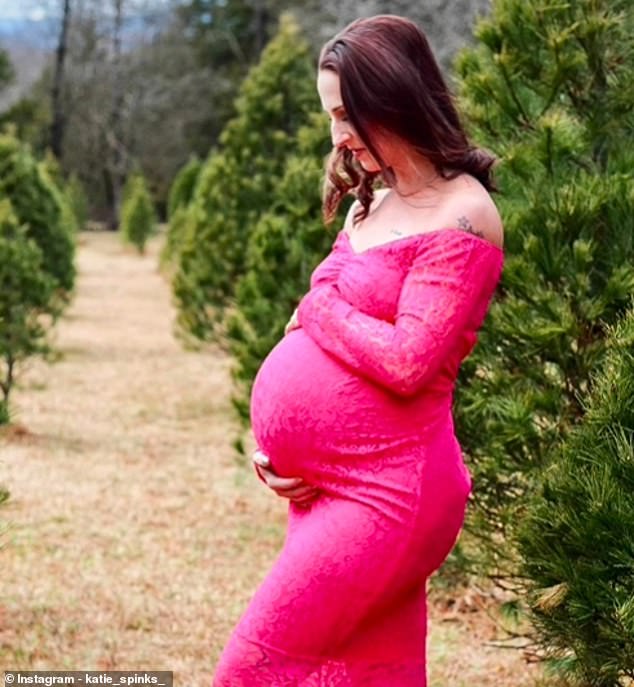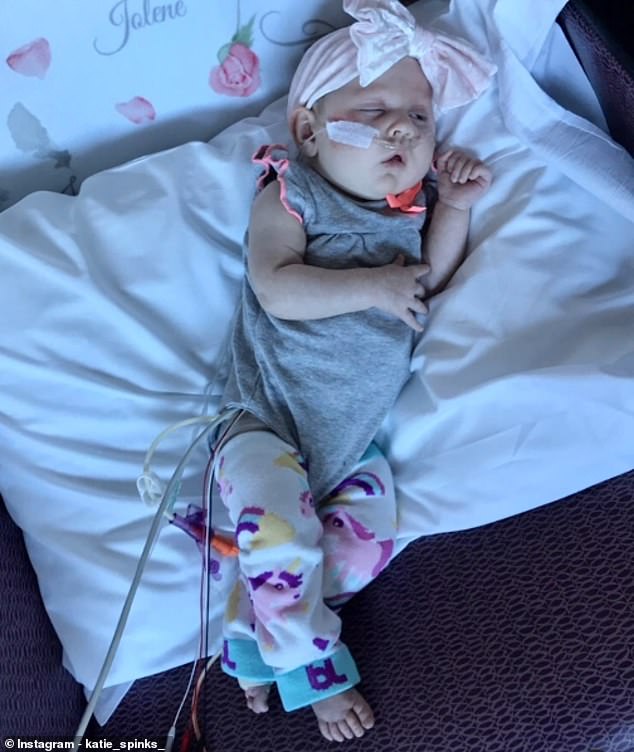My uterus ruptured during labor due to a rare drug complication and my baby suffered severe brain damage
Katie Spinks’ first three pregnancies went smoothly. She gave birth naturally to two beautiful, healthy girls and a boy and described their births as ‘magical’.
So when she, the Virginia mom, 35, had an induced labor at 39 weeks, she assumed it would be just like the previous three.
But she suffered a rare complication believed to be caused by drugs used to promote labor, which led to her uterus rupturing and causing catastrophic internal bleeding.
While she was fighting for her own life, so was her unborn baby deprived of oxygen and blood flow for almost 30 minutes, causing irreversible brain damage.
As a result, Jolene – now five – lives with a range of debilitating conditions, including epilepsy, hearing loss, cerebral palsy and tube feeding.
Katie Spinks’ daughter suffered a serious brain injury after being deprived of oxygen during complications during her delivery
Mrs Spinks says Jolene will not live to the age of 13 and will require 24-hour care for the rest of her life.
“Agreing to an induction was the biggest regret of my life,” Ms Spinks told DailyMail.com, fighting back tears.
‘I feel enormous guilt about it. If I had never agreed to it, we wouldn’t have had this conversation.’
Due to the lack of blood and oxygen in her developing brain, little Jolene suffered an irreversible injury known as hypoxic ischemic encephalopathy (HIE).
It affects roughly one in every thousand live births in the US and just five minutes is enough to cause permanent damage.
Women who have had a caesarean section are at risk because the scar can break open due to strong contractions.
But Ms. Spinks’ births were all natural, making her case particularly rare: it occurred in less than 0.5 percent of induced pregnancies.
Lisa Jackson, an assistant clinical professor in the department of obstetrics, gynecology and reproductive sciences at Mount Sinai in New York, told DailyMail.com that cases like Ms. Spinks’s are tragic but virtually rare.
“In one study reported by the National Institute of Health, the risk of uterine rupture was 3.3 in 100,00 deliveries,” she said.
‘For comparison: the chance of being hit by a car as a pedestrian is 1 in 4,200 in some studies.’
But Ms. Spinks finds no comfort in these statistics. ‘The most important thing I tell women; rare statistics comfort us, until we become one,” she told DailyMail.com.

The 35-year-old from Virginia told DailyMail.com that she was in “good health” while pregnant with her daughter Jolene and had “done nothing wrong, nothing”

Looking ahead Mrs. Spinks, pictured with her four children, says her main goal is to focus on the present “because the future is not guaranteed.”
Mrs Spinks considers the entire experience surrounding her fourth birth to be ‘traumatic’, with the ruptured uterus causing her great pain.
Unable to push her baby out, doctors tried to free Jolene several times using a vacuum aspirator.
They tried ‘frantically’ three times and after the third attempt Mrs Spinks said she ‘passed out and didn’t wake up’.
By the time the expectant mother was in an operating room to have an emergency C-section, almost two hours had passed.
Continuing the harrowing story, she says: “I needed a three-hour operation to save my life and my daughter needed multiple rounds of CPR and life-changing interventions to bring her back.
‘We were rescued right next to each other. Jolene was without oxygen for a significant period of time.”
After her birth, Jolene spent 68 days in the NICU, almost losing her life several times. Ultimately, her condition was stable enough to return home.

Unable to push her baby out, doctors tried to free Jolene several times using a vacuum aspirator

In an effort to raise awareness around HIE, Ms. Spinks regularly shares content on social media
In an attempt to receive compensation for what she experienced, Ms Spinks says she has tried ‘several times’ to take the hospital that performed the delivery to court.
Ms. Spinks wants to raise awareness about HIE and regularly shares content social media.
In addition to talking about Jolene’s condition, she also opened up about two miscarriages she’s had since Jolene was born, which led to her having a hysterectomy.
She said her uterus was badly damaged by Jolene’s birth, “upside down and completely incompatible with life.”
Her surgeon told her that the birthing doctor “should have just removed it, he said it was one giant scar that had little to no recognition as a uterus.”
Despite her disability, the full-time mother says Jolene is “the happiest, most cheerful, sassy, beautiful, strong and resilient girl.”
Looking ahead, Ms. Spinks says her main goal is to focus on the present, “because the future is not guaranteed.”
She concludes, “We know she doesn’t have much time with us anymore. Any damage to her brain damages her body over time.
“But she refuses to let herself be a little girl with a brain injury. She fights and she fights hard. I’m so proud of her and so proud to be her mother.’
